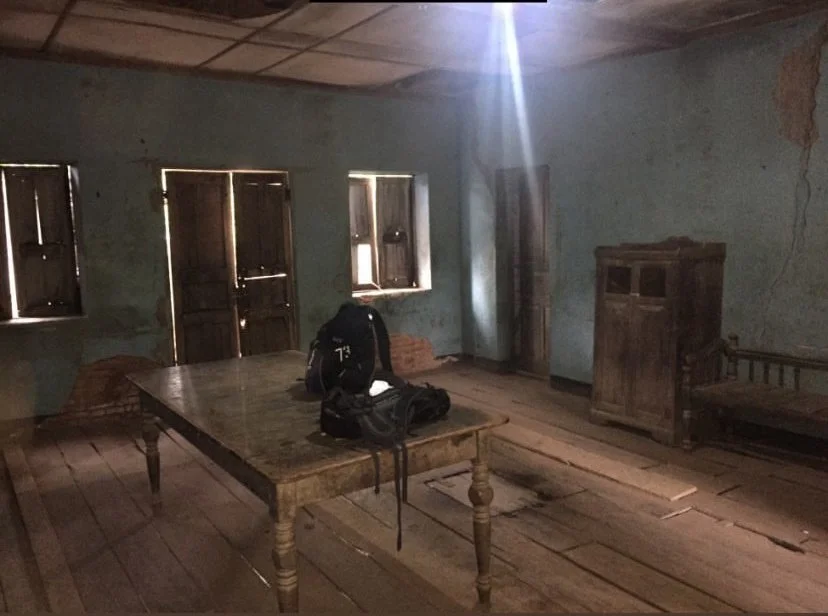Beneath the floorboards
A personal reflection on vocation, justice and why work is much more than a job for me
I'd never been to Africa before. And in honesty, before I was asked to go as part of a new job I'd agreed to take, I could not have shown you where in Africa Togo was situated.
But after taking a job with a large Christian children's charity, something of a dream role for me, I found myself in a Heathrow coffee shop at 5am meeting a group of new people. It was January 2014, and little did I know, I was about to walk into a room that would stay with me forever.
The leader of the group at Heathrow was a significant donor supporting the charity, and he had brought a few of his team along for the trip to see some work that his organisation had funded.
As I was the only member of the charity's staff there at Heathrow, I was a bit embarrassed when he asked the perfectly natural question, 'How long have you worked for the charity?' My answer, 'this is day 2', must have made him question whether or not the charity truly valued his significant contributions I thought to myself.
Though I could relay some moving, hilarious and eye-opening incidents from the journey, let me cut to the chase. We certainly saw some great work. Families and churches that had received the gift of clean water, the work was good and the donor was clearly moved by what he saw.
As good as the projects were, it was on a day off, that this memorable moment occurred. Our group were taken to an old house located along a dry dirt track between the capital city of Lome and its port.
A slave traders house in Togo.
The dryness of the dusty road and the lush, green vegetation on either side of it were striking. It was quite isolated and certainly larger than most properties that we had seen in town. Inside the house we could see a large open plan area that doubled up as a dining and lounger area. The house was old but solid. Bolts of invading sunshine sliced through the room's dank, claustrophobic atmosphere.
Close to the centre of the room, beside an antique dining table, a trap door in the floor demanded the attention of anyone who entered the room.
'You can lift and go down' said our guide in a 'I've done this a thousand times before' tone.
We didn't need to be offered twice and so we lifted the trap door and crouched beneath the floorboards to see what lay beneath. The answer?
Not much. A 3' drop to an unlit dirt floor. The high Togolese temperatures and humidity, along with the aroma of well-aged wooden floorboards left me feeling interested but uncomfortable.
I recall vividly what happened next as our guide explained to us that this was the former home of a slave trader. She told us that while he awaited the arrival of a slave ship at the port, he would keep as many as 100 slaves bound and shut away beneath the floorboards.
100 people. Their tortuous journey of unjust incarceration and lifelong slavery, only just beginning.
As I stood with my upper half above the floorboards, and my legs beneath, I can clearly recall thinking, 'how could anyone sit at that table eat their food and drink their wine with a hundred fellow human beings suffering right beneath their feet?'
And just as quickly as that thought landed, so did the next one.
'But Mark, such suffering still happens in many places, for millions of people. It is hidden away from your privileged wealthy sight, but it is has not stopped. The suffering is outsourced and very much hidden beneath the floorboards still.'
And at that moment, I realised that in some way, however small, it was my responsibility to be a shaft of light and to carefully understand and bring attention to some of the most unjust practices of our modern 'post-abolition' world. Modern slavery may be out of our view, but it is still a hidden reality.
The photo from the slave traders house remains on my wall. It drives the work I do with Start Bay, supporting purpose-driven organisations to make a difference.
And crucially, this photograph is a foundation stone for the Freedom and Justice Partnership, which I have co-founded with Carl Beech. After visiting an artisanal cobalt mine in the DRC in 2024, we are working together to shine a light on the 40,000 children in South DRC who work in lethal conditions, under blistering heat, to extract much of the cobalt and copper that is used in our digital devices such as mobiles, laptops and electric cars.
We are not against such tech, and we are not the saboteurs of progress. But we are committed to shining a light on the thousands of children trapped beneath the floorboards of the digital and green revolutions. It strikes me that our generation may no longer sit on exposed wooden floors, but we still unknowingly build our lives on the hidden suffering of others. Only now it is mined, packaged, and hidden behind the glow of the screens we hold in our hands. The question is not whether suffering still exists. It is whether we are willing to lift the floorboards and face it. Feel free to contact directly to talk more about this work, or why not book some time for working through what you really want to achieve with the gift of time you have been given?

